
LLM-Dojo
欢迎来到 LLM-Dojo,这里是一个开源大模型学习场所,使用简洁且易阅读的代码构建模型训练框架(支持各种主流模型如Qwen、Llama、GLM等等)、RLHF框架(DPO/CPO/KTO/PPO)等各种功能。👩🎓👨🎓
Stars: 612
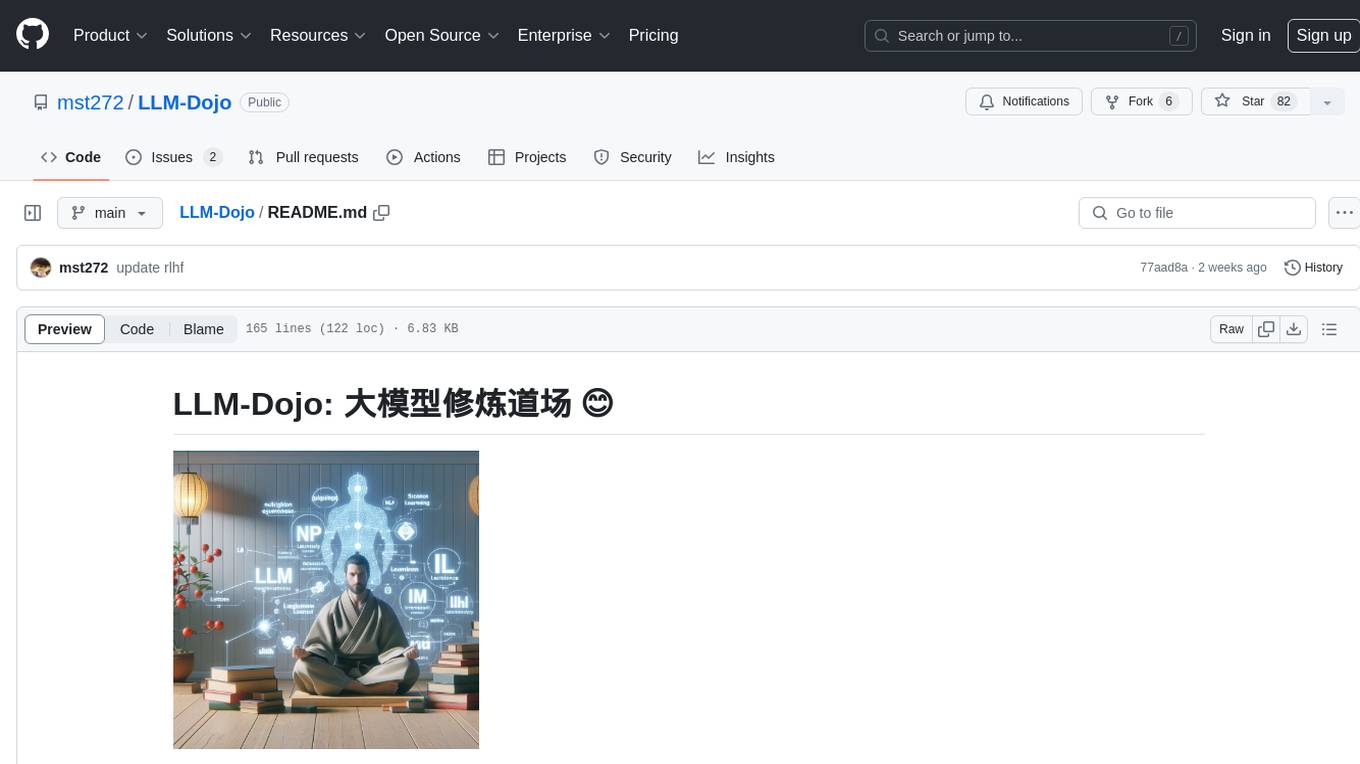
LLM-Dojo is an open-source platform for learning and practicing large models, providing a framework for building custom large model training processes, implementing various tricks and principles in the llm_tricks module, and mainstream model chat templates. The project includes an open-source large model training framework, detailed explanations and usage of the latest LLM tricks, and a collection of mainstream model chat templates. The term 'Dojo' symbolizes a place dedicated to learning and practice, borrowing its meaning from martial arts training.
README:
Tips: 图片完全由AI生成
LLM-Dojo使用简洁且易阅读的代码构建LLM、VLM模型训练、RLHF框架等各种功能,使项目易于学习且方便魔改与实验,与大多开源框架相同均是基于huggingface。 主要内容如下:
- SFT训练框架: 简洁清晰的开源大模型训练框架,支持Deepspeed多卡、Lora、QLora、全参等训练,自动适配chat template。
- VLM多模态训练框架: 支持多模态各种任务训练(目前仅实现QA),自动适配模型template。
- RLHF框架: RLHF训练框架,持续更新,包括 知识蒸馏,DPO、RLOO、SimPO等各种强化学习方法,适配Deepspeed多卡及Lora,一张A100即可运行,详情可见: RLHF。
-
最新LLM tricks详解: 持续更新大模型领域最新tricks介绍,包括新论文方法的复现等,希望可以给你一些创新的想法,该模块主要集中在
llm_tricks文件夹下。
- [2025-02-19] 增加VLLM推理,.一系列RL方法实验(GRPO)及详解正在路上🫡
- [2024-12-31] 支持多模态训练,可见多模态训练(VLM)
- [2024-11-06] 增加RLHF KTO训练方法
- [2024-11-06] 重构RLHF,具体可见目录中RLHF训练框架部分
- [2024-10-31] 添加auto_adapt参数控制是否自动适配template、更新优化DPO训练(迁移至RLHF目录下)
- [2024-10-15] 增加知识蒸馏训练方法。可见知识蒸馏
- [2024-10-14] 删除chat template模块,因为使用tokenizer的apply_chat_template即可
- [2024-09-20] 增加evaluate模块,一个简洁的模型评测框架,目前仅支持Humaneval。可见Evaluate
More news...
- [2024-08-27] 🤓增加从零实现自己编写DPO、SimPO代码,包括数据、loss、训练等部分。可见DPO example
- [2024-08-08] 支持直接修改配置文件启动及命令行启动,增加框架适配数据处理代码。
- [2024-08-04] 支持自适应单轮或多轮对话,无需指定单轮或多轮,训练根据数据自行判断单轮或多轮。且可自主设置system命令。可见训练数据格式说明
- [2024-07-19] RLHF 强化学习框架新增CPO,SimPO,以及二者融合CPO-SimPO
- [2024-07-16] RLHF 强化学习框架更新完成,支持deepspeed单卡/多卡 进行强化学习lora、qlora等训练,详细可见RLHF
- [2024-06-9] 🚀支持DPO训练,分为单轮对话DPO(自己构建,方便魔改)和多轮对话DPO(简洁实现),支持deepspeed的lora和qlora,具体介绍可见 DPO使用说明
- [2024-06-5] 🤓llm_tricks 增加从头开始实现MOE
- [2024-06-10] 🚀增加一步一步实现Transformer技术发文(包括代码等从零介绍),可见 技术发文
- [2024-05-18] 🤓支持Deepspeed单机多卡、单机单卡的Lora、Qlora、全量微调等训练!
- [2024-04-28] 🚀 更新dora微调原理示例、支持qwen模型微调
RLHF训练框架,支持并持续更新 知识蒸馏、Reward、PPO、DPO、RLOO、SimPO、KTO等各种强化学习方法,适配Deepspeed多卡及Lora,一张A100即可运行。 详情可见: RLHF。
主要包括三类:
1、RLHF
2、Knowledge Distillation (知识蒸馏)
3、Rejected Sampling (拒绝采样) :待更新
理论上支持对所有模型的微调,下述仅为测试过。
支持基于Deepspeed的多卡/单卡 Lora、Qlora、Dora微调:
- [x] Qwen(Qwen1.5/Qwen2)
- [x] Yi
- [x] Gemma系列
- [x] Phi-3
- [x] Deepseek
- [x] MiniCPM
- [x] Llama系列
- [x] deepseek-coder
- [x] 哔哩哔哩 Index-1.9B
- [x] baichuan系列
- [x] GLM系列
SFT数据格式为user(system) assistant标准模式,无需指定单轮或多轮,训练根据数据自行判断单轮或多轮。
示例如下,示例文件可参见data/sft_data.jsonl:
{"message": [{"role": "system", "content": "You are a friendly chatbot who always responds in the style of a pirate"},{"role": "user", "content": "How many helicopters can a human eat in one sitting"},{"role": "assistant", "content": "Sure! Here are some ways to eat bananas and dragonfruits together"},{"role": "user", "content": "你好"},{"role": "assistant", "content": "hellow"}]}可根据需求自行决定是否增加system字段,建议训练数据没有特殊需求可删除system字段
训练参数中auto_adapt参数控制是否自动适配template,如设置为False,则不自动适配,按原始的content进行训练。
鉴于框架指定格式数据可能会跟常规数据有些不同,故可以通过utils/script/generate_data.py文件进行处理,输入应为正常的instruction和output的jsonl格式文件,
如下:
{"instruction":"将这个句子改写成将来时态:“太阳将会照耀明亮。”","output":"太阳将会散发温暖的光芒。"}运行后即可得到无system的user、assistant指定格式。
目前支持直接python命令单卡训练、deepspeed(推荐使用)单机多卡及单机单卡训练. 所有方式均支持Qlora、Lora、Dora方法。
1、 支持命令行传参启动,启动示例可见: run_example.sh。 相关参数在train_args下的common_args.py和sft/base.py。
bash run_example.sh2、 也支持参数文件直接修改默认值,改好参数后运行以下命令启动:
deepspeed --include localhost:6,7 main_train.py更详细的Deepspeed原理及解释可以看文章:Deepspeed配置及使用讲解
显存占用测试如下:
| 策略 | 模型大小 | 显存占用 |
|---|---|---|
| Lora | Qwen(7B) | 26g |
| Lora+Zero2 | Qwen(7B) | 26g |
| Lora+zero3 | Qwen(7B) | 16g |
支持Deepspeed多卡 Lora、Qlora,冻结vision、冻结projector训练等
- Visual Question Answering
Visual Question Answering:
- metadata.jsonl: 包含所有图片与文字信息,示例如下:
{"file_name":"Images/P0003_0004.png", "messages":[{"question":"how are you", "answer":"i am fine"}]}其中file_name为train_data_path下的的图片路径,具体可如下:
train_data_path
├─ metadata.jsonl
└─ Images
└─ P0003_0004.png
└─ ...........png
通过freeze_vision、freeze_projector参数控制是否冻结vision、projector。
bash run_vlm_example.sh所有相关的trciks及讲解都在llm_tricks文件夹下
More news...
项目学习了优秀开源项目,感谢huggingface、流萤及一些国内外开源项目。
🪂 无论是提出问题(Issue)还是贡献代码(Pull Request),都是对项目的巨大支持。
For Tasks:
Click tags to check more tools for each tasksFor Jobs:
Alternative AI tools for LLM-Dojo
Similar Open Source Tools

LLM-Dojo
LLM-Dojo is an open-source platform for learning and practicing large models, providing a framework for building custom large model training processes, implementing various tricks and principles in the llm_tricks module, and mainstream model chat templates. The project includes an open-source large model training framework, detailed explanations and usage of the latest LLM tricks, and a collection of mainstream model chat templates. The term 'Dojo' symbolizes a place dedicated to learning and practice, borrowing its meaning from martial arts training.
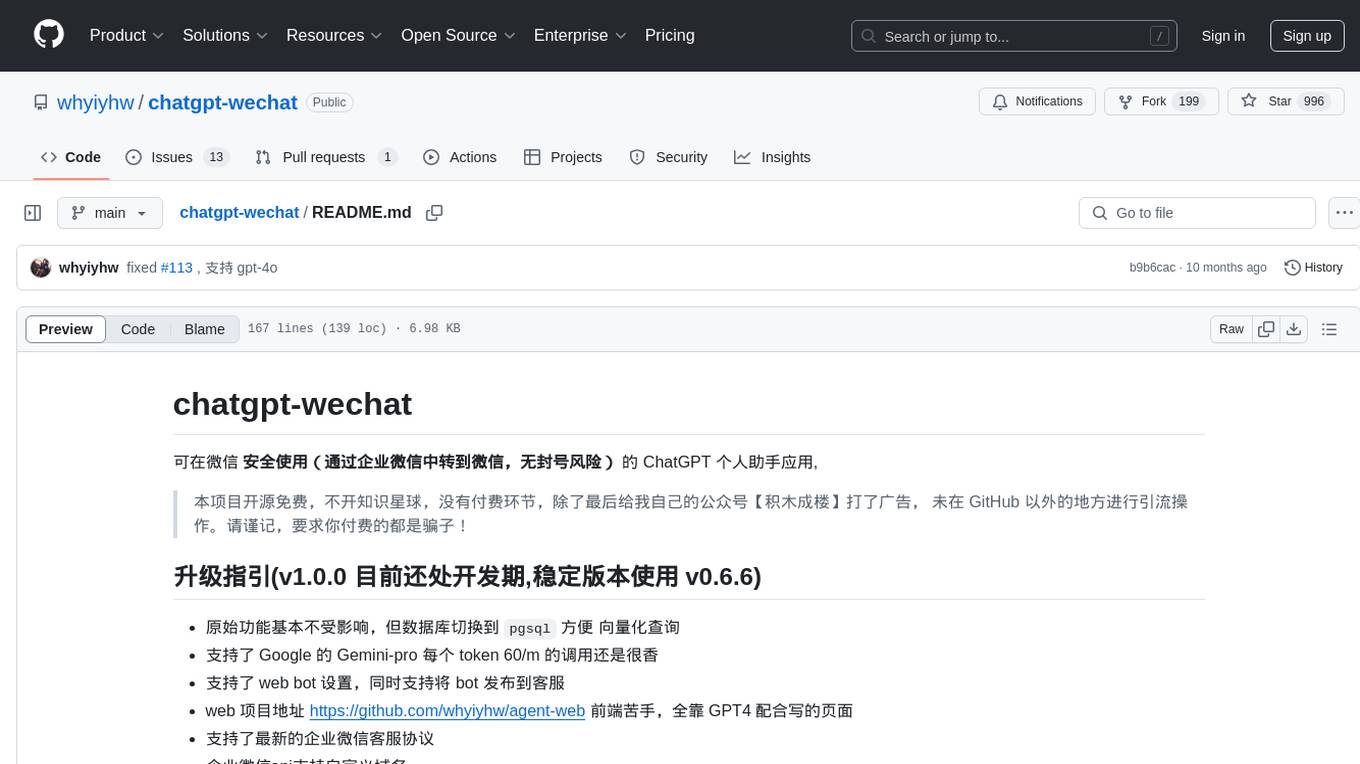
chatgpt-wechat
ChatGPT-WeChat is a personal assistant application that can be safely used on WeChat through enterprise WeChat without the risk of being banned. The project is open source and free, with no paid sections or external traffic operations except for advertising on the author's public account '积木成楼'. It supports various features such as secure usage on WeChat, multi-channel customer service message integration, proxy support, session management, rapid message response, voice and image messaging, drawing capabilities, private data storage, plugin support, and more. Users can also develop their own capabilities following the rules provided. The project is currently in development with stable versions available for use.
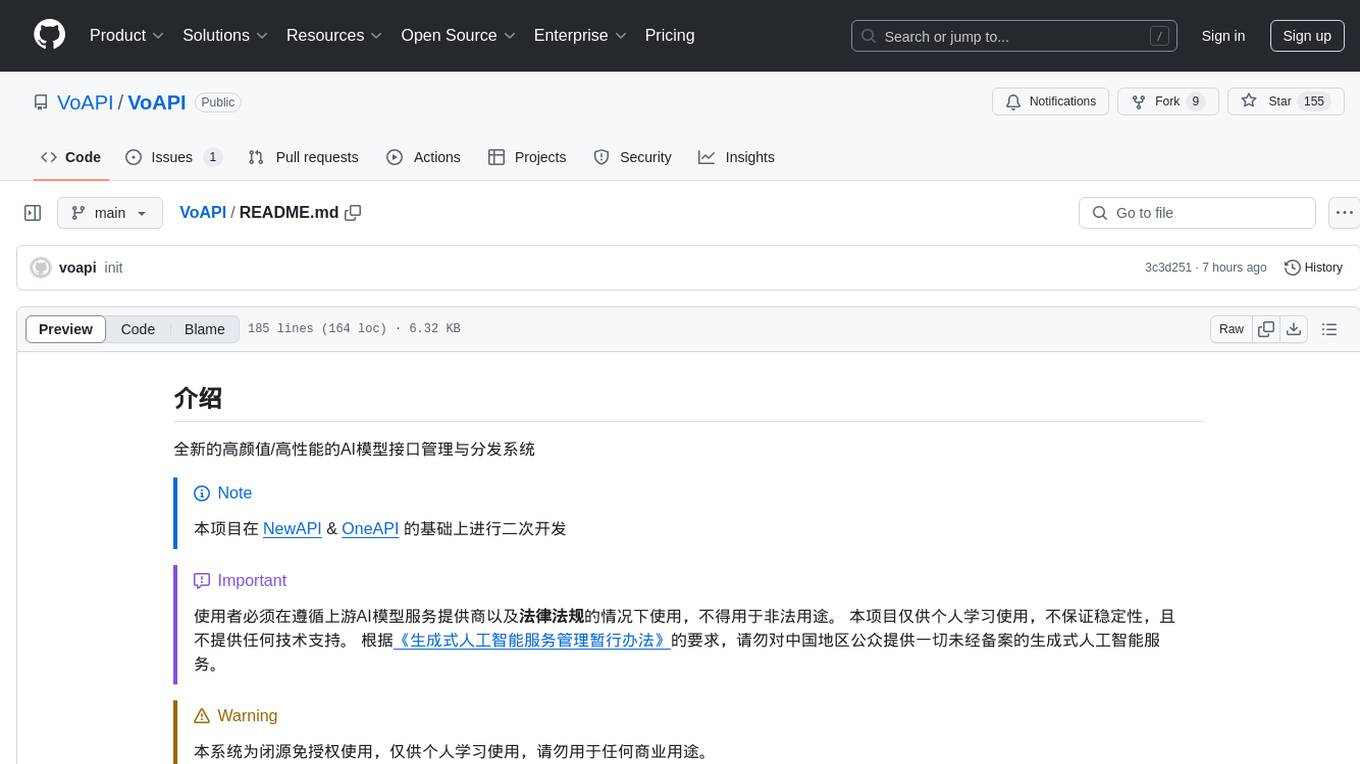
VoAPI
VoAPI is a new high-value/high-performance AI model interface management and distribution system. It is a closed-source tool for personal learning use only, not for commercial purposes. Users must comply with upstream AI model service providers and legal regulations. The system offers a visually appealing interface with features such as independent development documentation page support, service monitoring page configuration support, and third-party login support. Users can manage user registration time, optimize interface elements, and support features like online recharge, model pricing display, and sensitive word filtering. VoAPI also provides support for various AI models and platforms, with the ability to configure homepage templates, model information, and manufacturer information.

ChatGPT-On-CS
This project is an intelligent dialogue customer service tool based on a large model, which supports access to platforms such as WeChat, Qianniu, Bilibili, Douyin Enterprise, Douyin, Doudian, Weibo chat, Xiaohongshu professional account operation, Xiaohongshu, Zhihu, etc. You can choose GPT3.5/GPT4.0/ Lazy Treasure Box (more platforms will be supported in the future), which can process text, voice and pictures, and access external resources such as operating systems and the Internet through plug-ins, and support enterprise AI applications customized based on their own knowledge base.
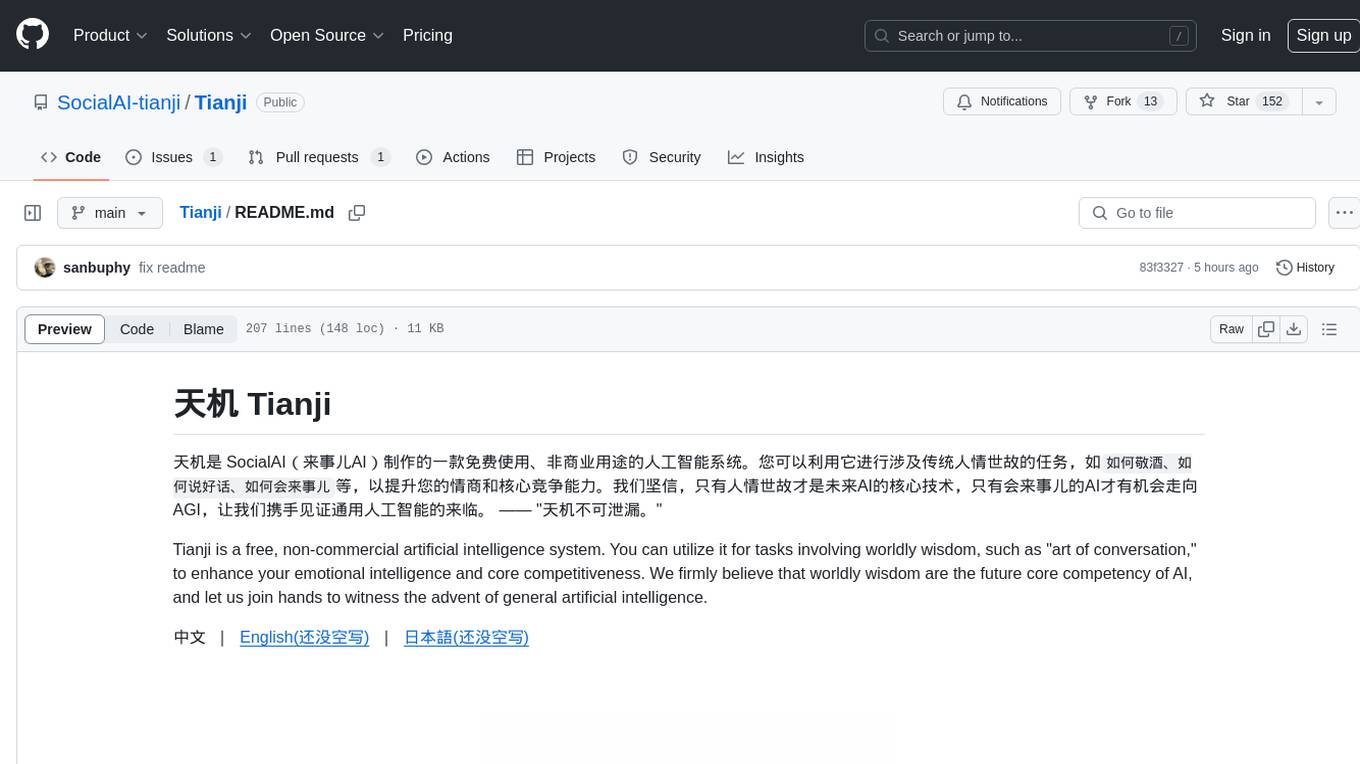
Tianji
Tianji is a free, non-commercial artificial intelligence system developed by SocialAI for tasks involving worldly wisdom, such as etiquette, hospitality, gifting, wishes, communication, awkwardness resolution, and conflict handling. It includes four main technical routes: pure prompt, Agent architecture, knowledge base, and model training. Users can find corresponding source code for these routes in the tianji directory to replicate their own vertical domain AI applications. The project aims to accelerate the penetration of AI into various fields and enhance AI's core competencies.
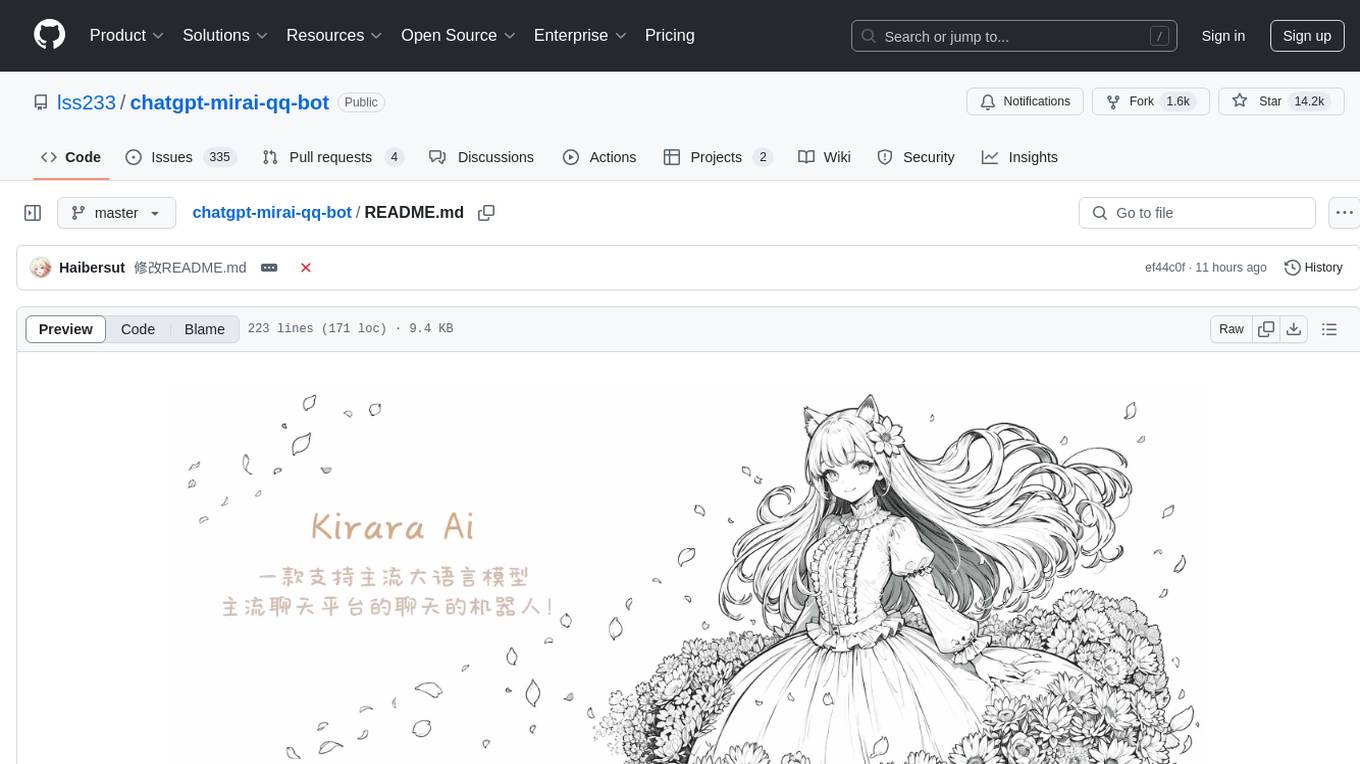
chatgpt-mirai-qq-bot
Kirara AI is a chatbot that supports mainstream language models and chat platforms. It features various functionalities such as image sending, keyword-triggered replies, multi-account support, content moderation, personality settings, and support for platforms like QQ, Telegram, Discord, and WeChat. It also offers HTTP server capabilities, plugin support, conditional triggers, admin commands, drawing models, voice replies, multi-turn conversations, cross-platform message sending, and custom workflows. The tool can be accessed via HTTP API for integration with other platforms.
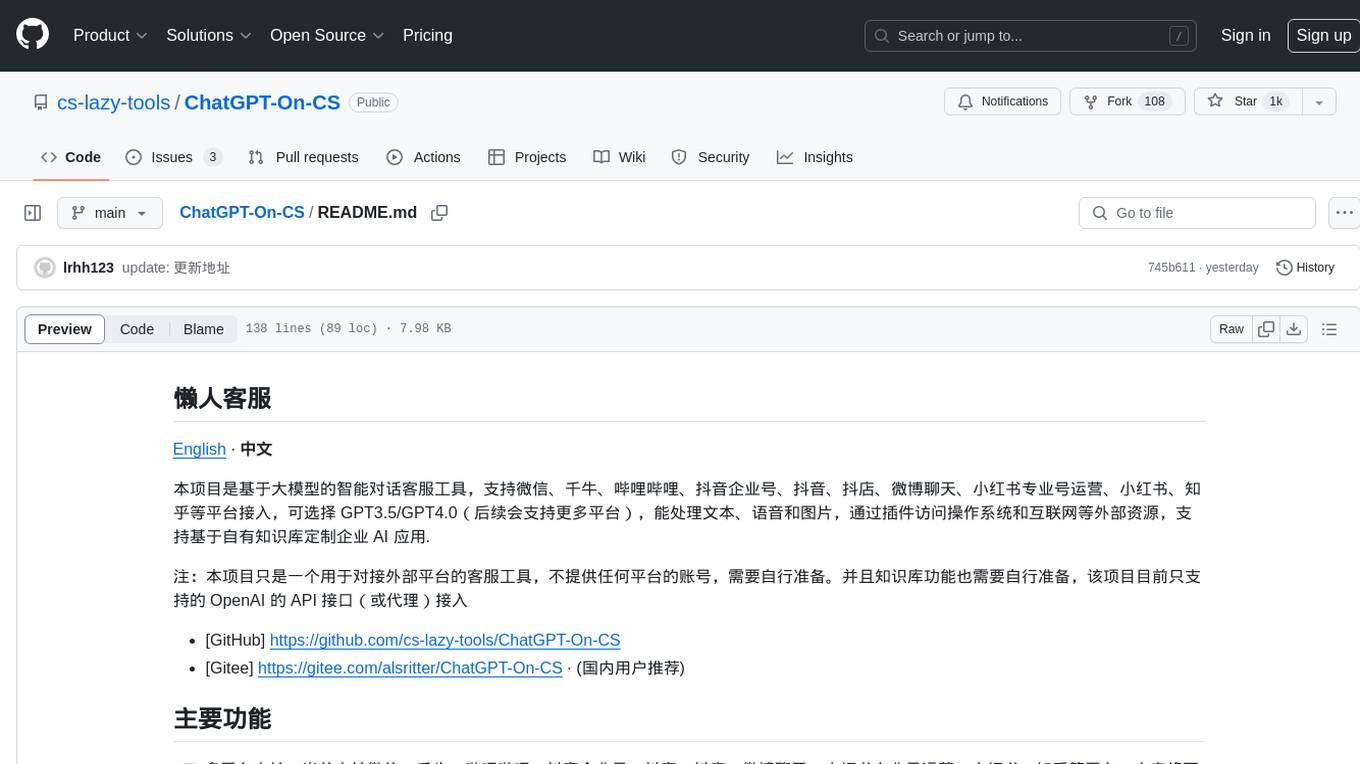
ChatGPT-On-CS
ChatGPT-On-CS is an intelligent chatbot tool based on large models, supporting various platforms like WeChat, Taobao, Bilibili, Douyin, Weibo, and more. It can handle text, voice, and image inputs, access external resources through plugins, and customize enterprise AI applications based on proprietary knowledge bases. Users can set custom replies, utilize ChatGPT interface for intelligent responses, send images and binary files, and create personalized chatbots using knowledge base files. The tool also features platform-specific plugin systems for accessing external resources and supports enterprise AI applications customization.
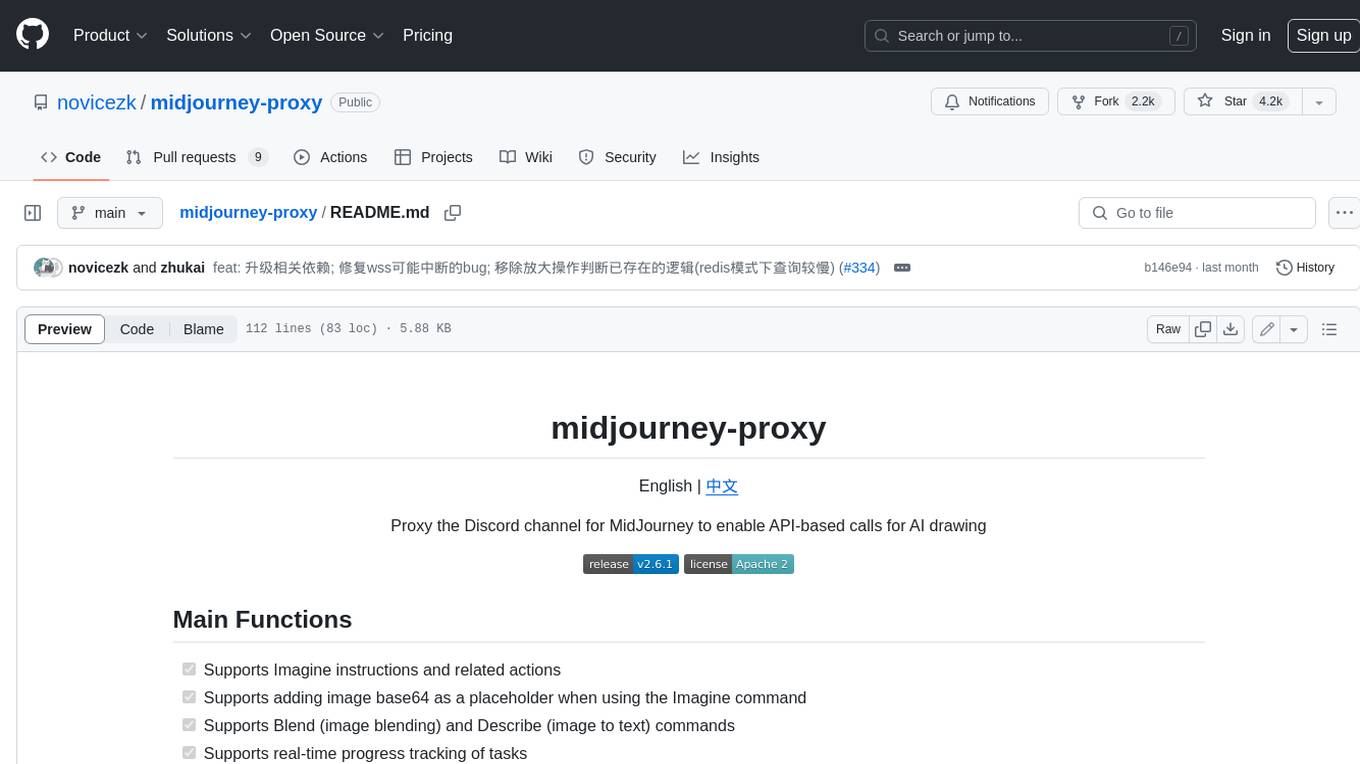
midjourney-proxy
Midjourney-proxy is a proxy for the Discord channel of MidJourney, enabling API-based calls for AI drawing. It supports Imagine instructions, adding image base64 as a placeholder, Blend and Describe commands, real-time progress tracking, Chinese prompt translation, prompt sensitive word pre-detection, user-token connection to WSS, multi-account configuration, and more. For more advanced features, consider using midjourney-proxy-plus, which includes Shorten, focus shifting, image zooming, local redrawing, nearly all associated button actions, Remix mode, seed value retrieval, account pool persistence, dynamic maintenance, /info and /settings retrieval, account settings configuration, Niji bot robot, InsightFace face replacement robot, and an embedded management dashboard.
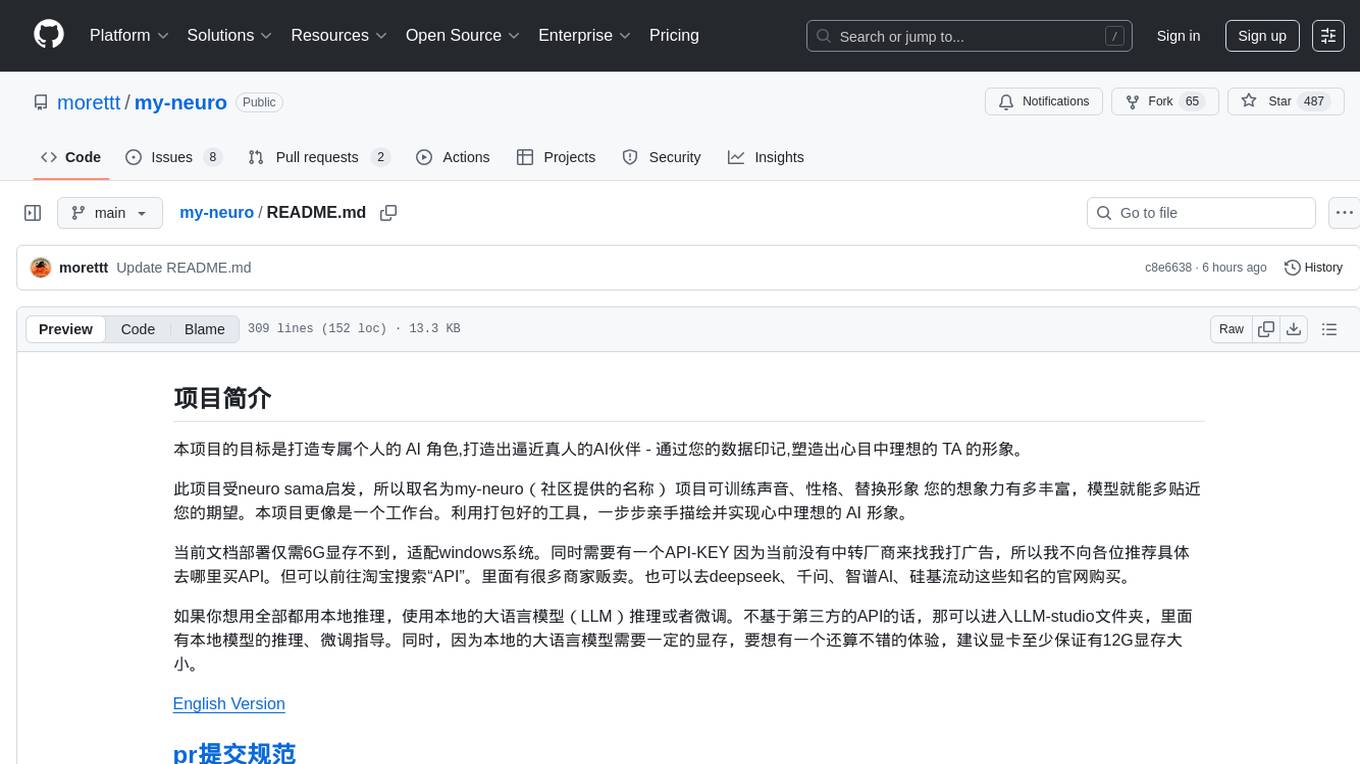
my-neuro
The project aims to create a personalized AI character, a lifelike AI companion - shaping the ideal image of TA in your mind through your data imprint. The project is inspired by neuro sama, hence named my-neuro. The project can train voice, personality, and replace images. It serves as a workspace where you can use packaged tools to step by step draw and realize the ideal AI image in your mind. The deployment of the current document requires less than 6GB of VRAM, compatible with Windows systems, and requires an API-KEY. The project offers features like low latency, real-time interruption, emotion simulation, visual capabilities integration, voice model training support, desktop control, live streaming on platforms like Bilibili, and more. It aims to provide a comprehensive AI experience with features like long-term memory, AI customization, and emotional interactions.
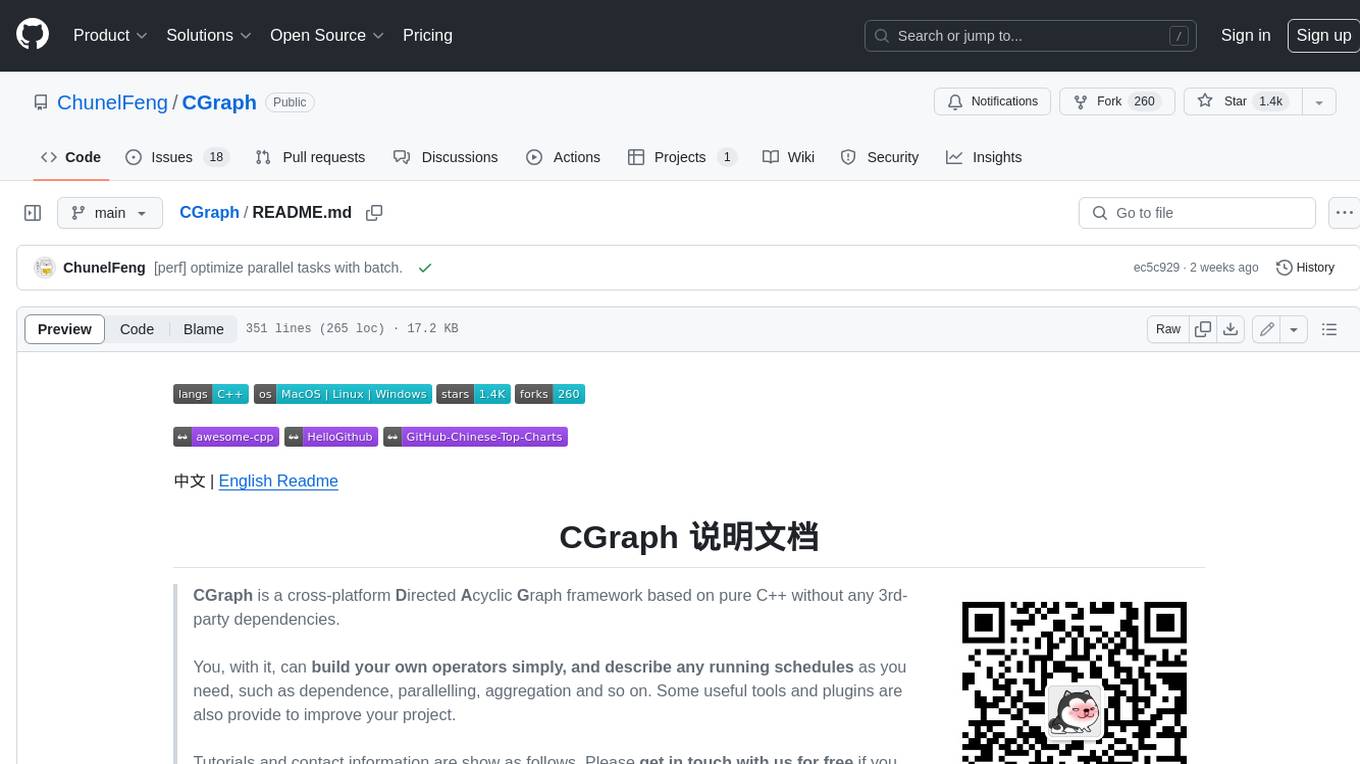
CGraph
CGraph is a cross-platform **D** irected **A** cyclic **G** raph framework based on pure C++ without any 3rd-party dependencies. You, with it, can **build your own operators simply, and describe any running schedules** as you need, such as dependence, parallelling, aggregation and so on. Some useful tools and plugins are also provide to improve your project. Tutorials and contact information are show as follows. Please **get in touch with us for free** if you need more about this repository.
siliconflow-plugin
SiliconFlow-PLUGIN (SF-PLUGIN) is a versatile AI integration plugin for the Yunzai robot framework, supporting multiple AI services and models. It includes features such as AI drawing, intelligent conversations, real-time search, text-to-speech synthesis, resource management, link handling, video parsing, group functions, WebSocket support, and Jimeng-Api interface. The plugin offers functionalities for drawing, conversation, search, image link retrieval, video parsing, group interactions, and more, enhancing the capabilities of the Yunzai framework.
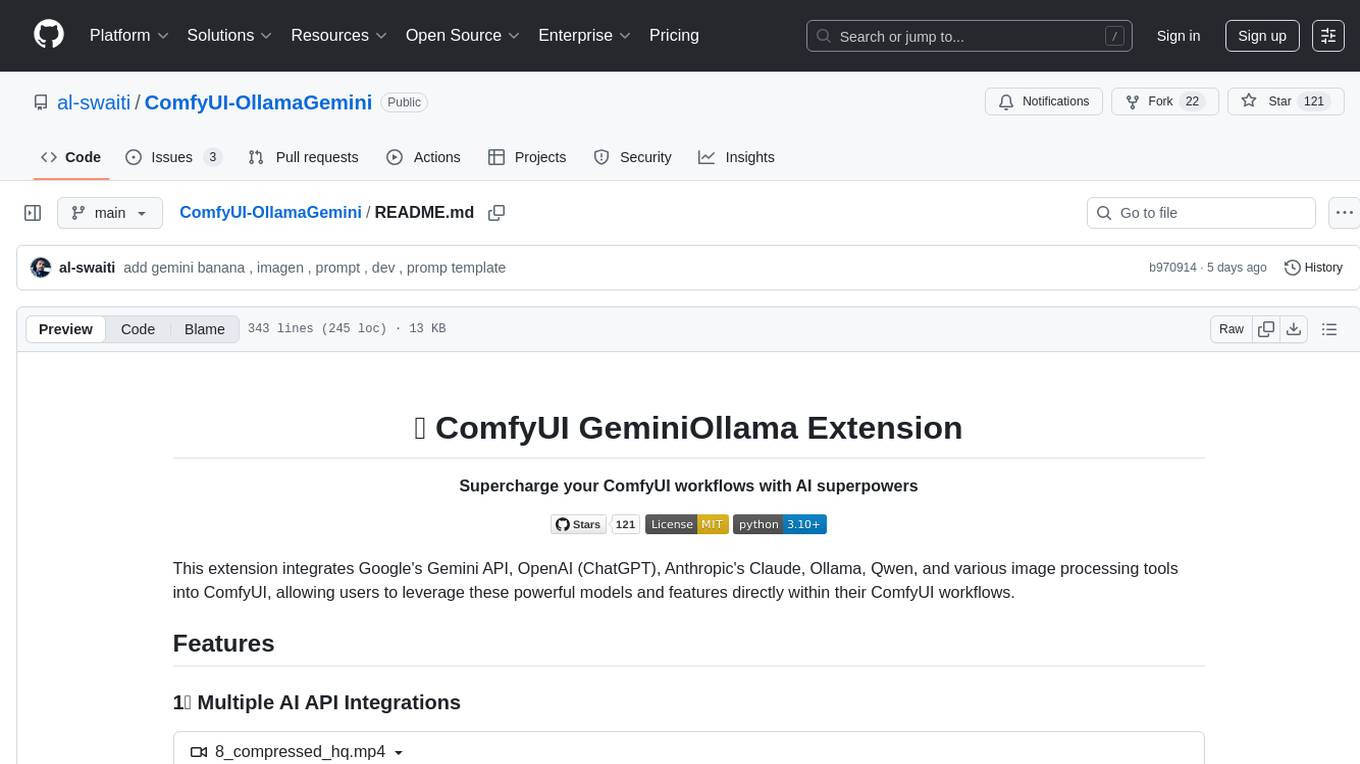
ComfyUI-OllamaGemini
ComfyUI GeminiOllama Extension integrates Google's Gemini API, OpenAI (ChatGPT), Anthropic's Claude, Ollama, Qwen, and image processing tools into ComfyUI for leveraging powerful models and features directly within workflows. Features include multiple AI API integrations, advanced prompt engineering, Gemini image generation, background removal, SVG conversion, FLUX resolutions, ComfyUI Styler, smart prompt generator, and more. The extension offers comprehensive API integration, advanced prompt engineering with researched templates, high-quality tools like Smart Prompt Generator and BRIA RMBG, and supports video & audio processing. It provides a single interface to access powerful AI models, transform prompts into detailed instructions, and use various tools for image processing, styling, and content generation.
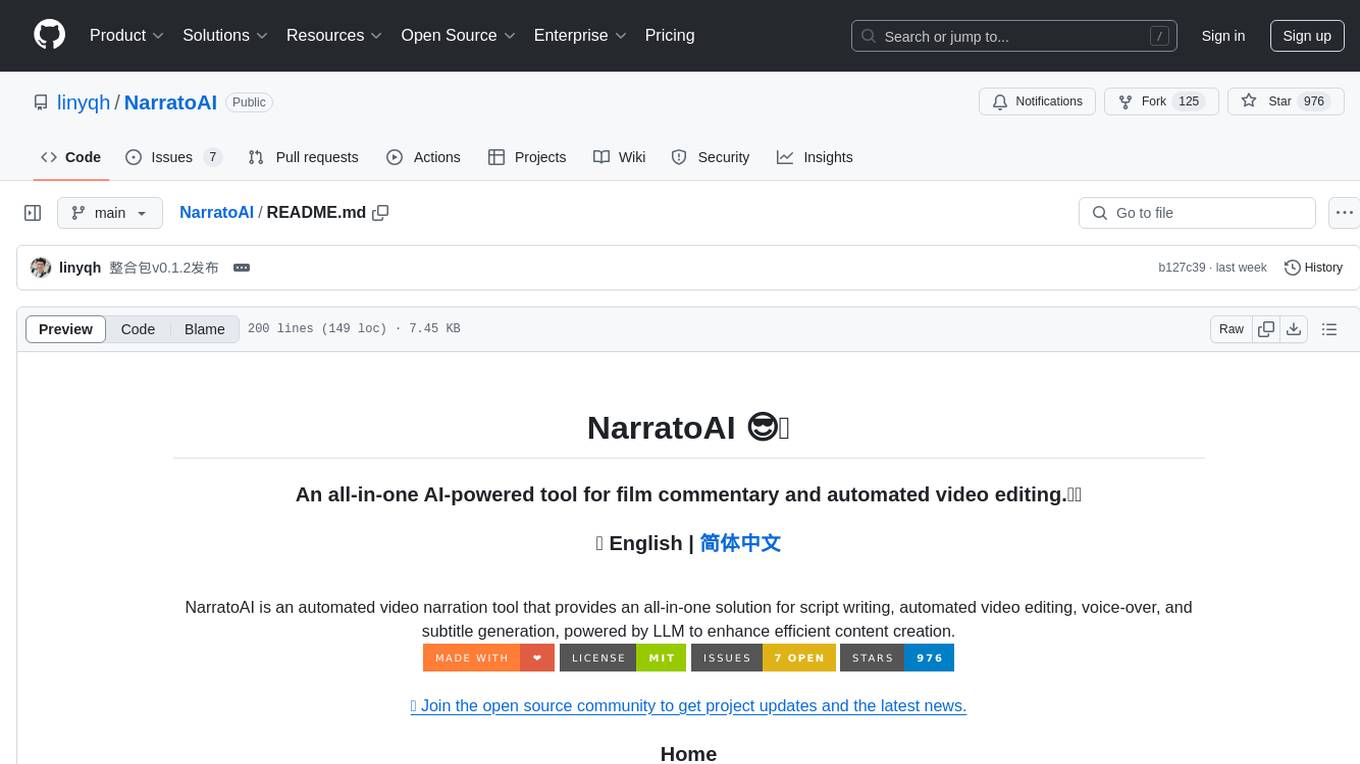
NarratoAI
NarratoAI is an automated video narration tool that provides an all-in-one solution for script writing, automated video editing, voice-over, and subtitle generation. It is powered by LLM to enhance efficient content creation. The tool aims to simplify the process of creating film commentary and editing videos by automating various tasks such as script writing and voice-over generation. NarratoAI offers a user-friendly interface for users to easily generate video scripts, edit videos, and customize video parameters. With future plans to optimize story generation processes and support additional large models, NarratoAI is a versatile tool for content creators looking to streamline their video production workflow.
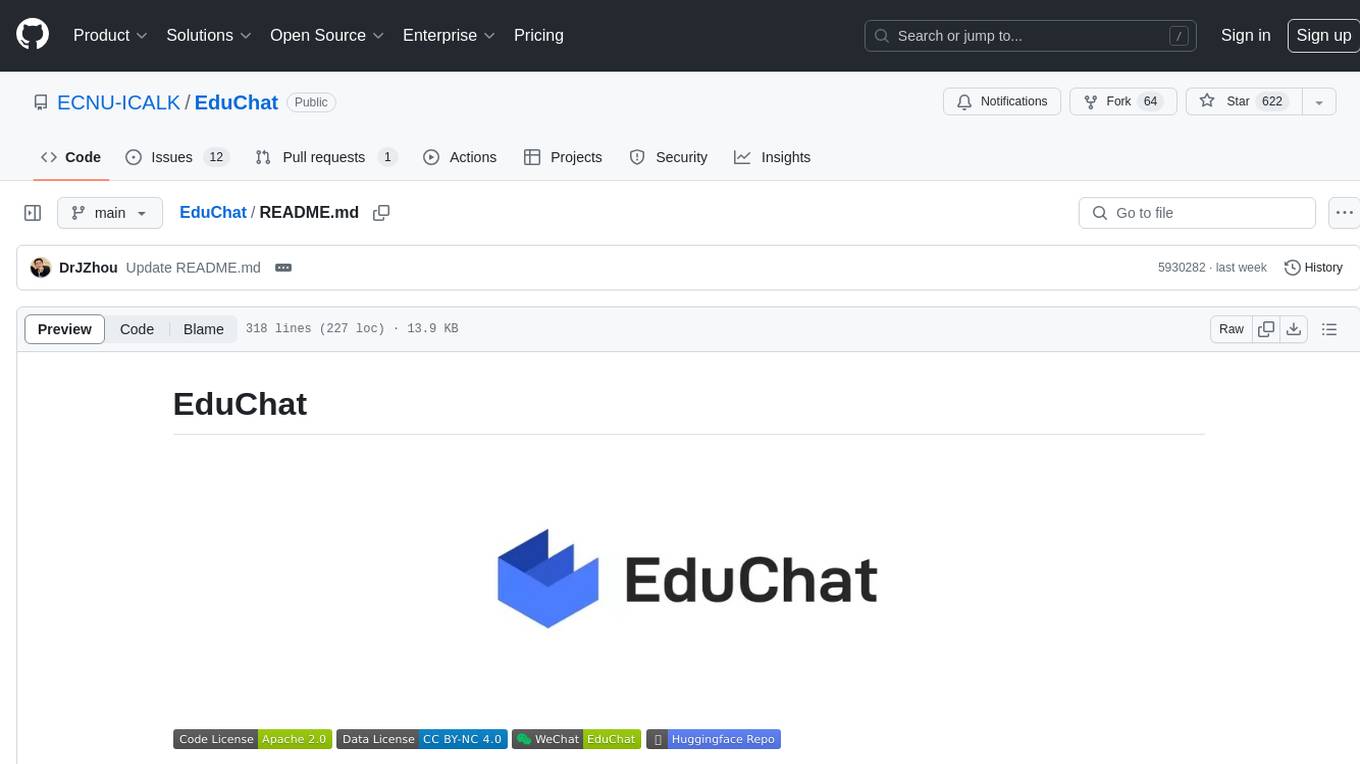
EduChat
EduChat is a large-scale language model-based chatbot system designed for intelligent education by the EduNLP team at East China Normal University. The project focuses on developing a dialogue-based language model for the education vertical domain, integrating diverse education vertical domain data, and providing functions such as automatic question generation, homework correction, emotional support, course guidance, and college entrance examination consultation. The tool aims to serve teachers, students, and parents to achieve personalized, fair, and warm intelligent education.
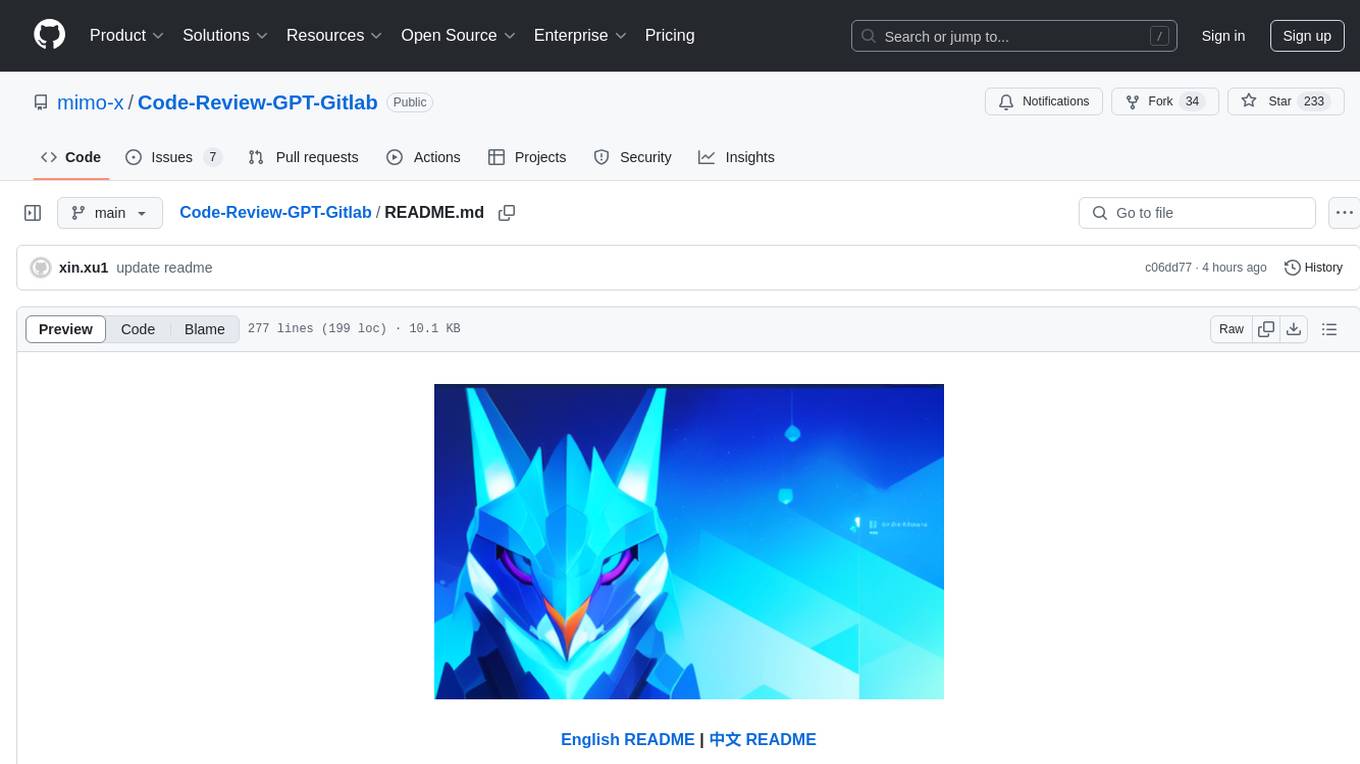
Code-Review-GPT-Gitlab
A project that utilizes large models to help with Code Review on Gitlab, aimed at improving development efficiency. The project is customized for Gitlab and is developing a Multi-Agent plugin for collaborative review. It integrates various large models for code security issues and stays updated with the latest Code Review trends. The project architecture is designed to be powerful, flexible, and efficient, with easy integration of different models and high customization for developers.
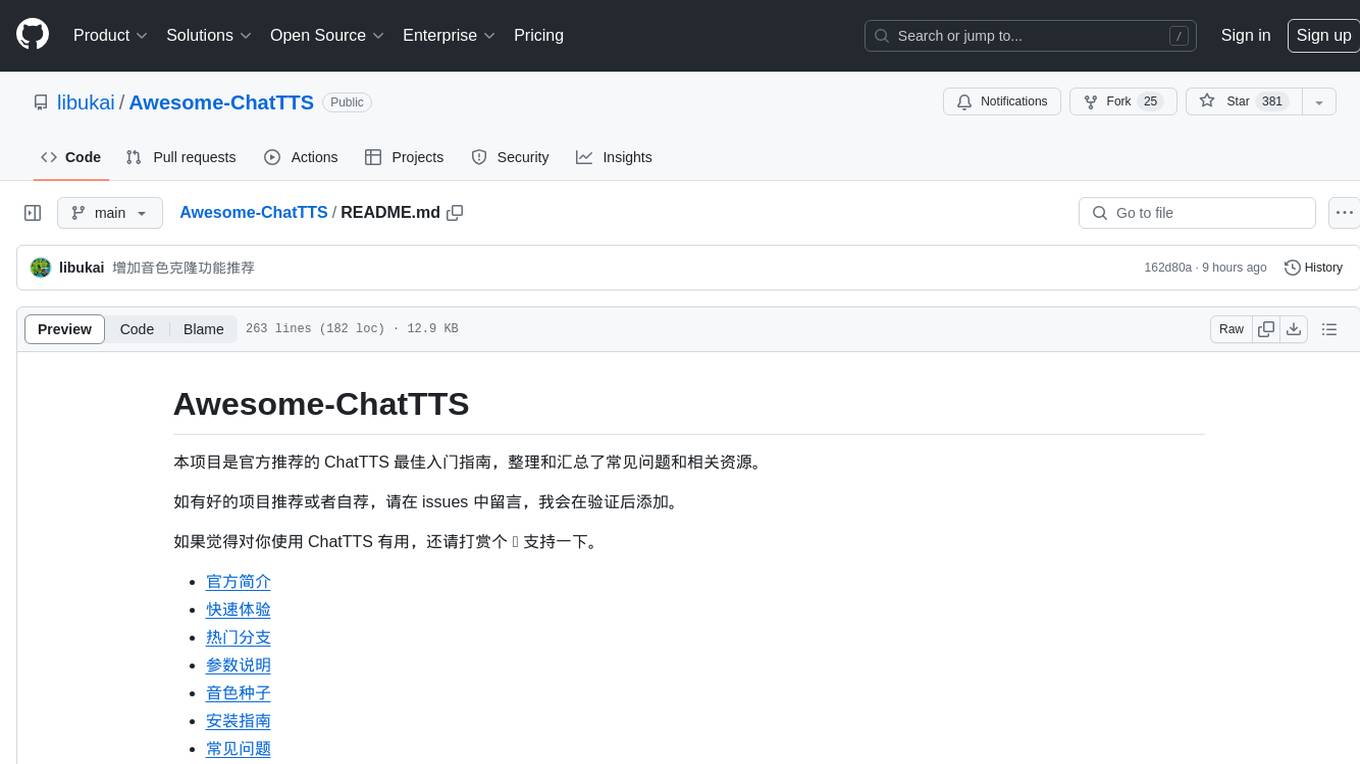
Awesome-ChatTTS
Awesome-ChatTTS is an official recommended guide for ChatTTS beginners, compiling common questions and related resources. It provides a comprehensive overview of the project, including official introduction, quick experience options, popular branches, parameter explanations, voice seed details, installation guides, FAQs, and error troubleshooting. The repository also includes video tutorials, discussion community links, and project trends analysis. Users can explore various branches for different functionalities and enhancements related to ChatTTS.
For similar tasks

LLM-Dojo
LLM-Dojo is an open-source platform for learning and practicing large models, providing a framework for building custom large model training processes, implementing various tricks and principles in the llm_tricks module, and mainstream model chat templates. The project includes an open-source large model training framework, detailed explanations and usage of the latest LLM tricks, and a collection of mainstream model chat templates. The term 'Dojo' symbolizes a place dedicated to learning and practice, borrowing its meaning from martial arts training.

mindsdb
MindsDB is a platform for customizing AI from enterprise data. You can create, serve, and fine-tune models in real-time from your database, vector store, and application data. MindsDB "enhances" SQL syntax with AI capabilities to make it accessible for developers worldwide. With MindsDB’s nearly 200 integrations, any developer can create AI customized for their purpose, faster and more securely. Their AI systems will constantly improve themselves — using companies’ own data, in real-time.
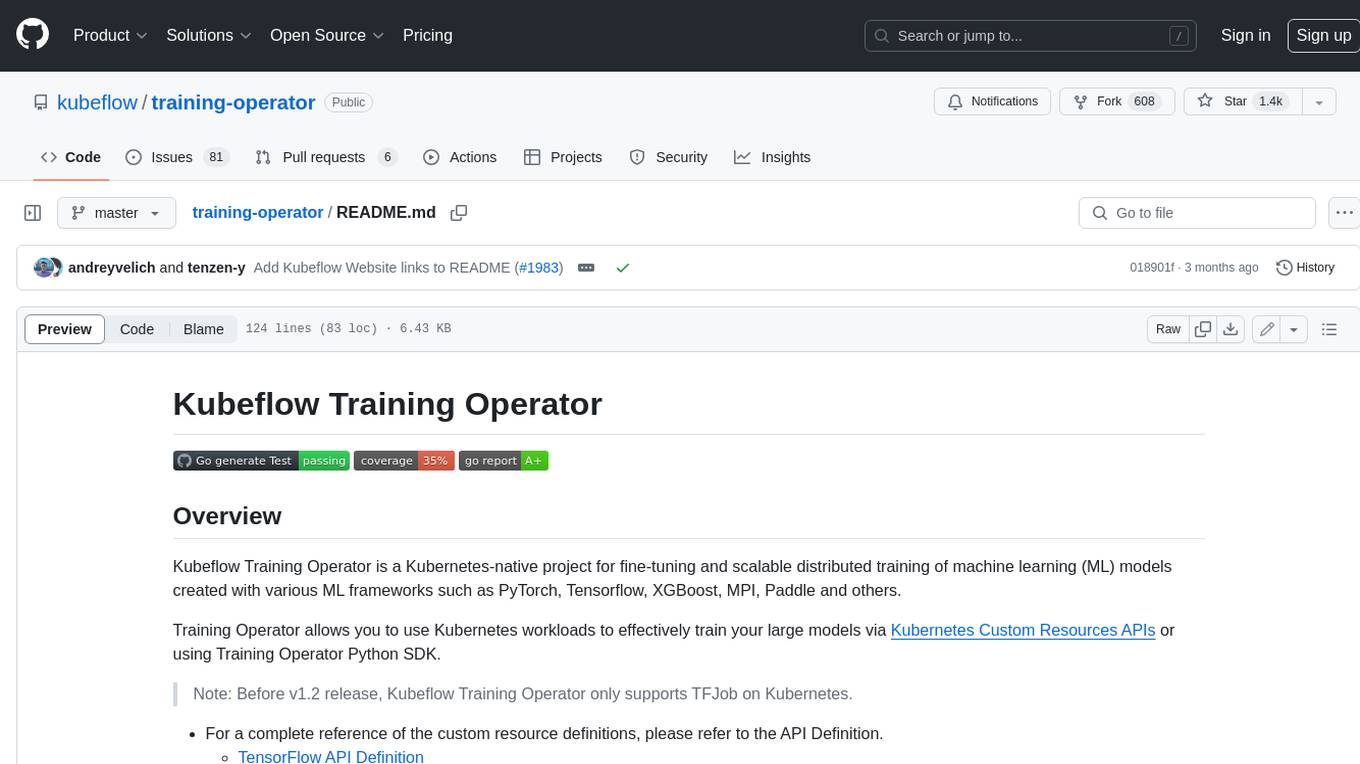
training-operator
Kubeflow Training Operator is a Kubernetes-native project for fine-tuning and scalable distributed training of machine learning (ML) models created with various ML frameworks such as PyTorch, Tensorflow, XGBoost, MPI, Paddle and others. Training Operator allows you to use Kubernetes workloads to effectively train your large models via Kubernetes Custom Resources APIs or using Training Operator Python SDK. > Note: Before v1.2 release, Kubeflow Training Operator only supports TFJob on Kubernetes. * For a complete reference of the custom resource definitions, please refer to the API Definition. * TensorFlow API Definition * PyTorch API Definition * Apache MXNet API Definition * XGBoost API Definition * MPI API Definition * PaddlePaddle API Definition * For details of all-in-one operator design, please refer to the All-in-one Kubeflow Training Operator * For details on its observability, please refer to the monitoring design doc.
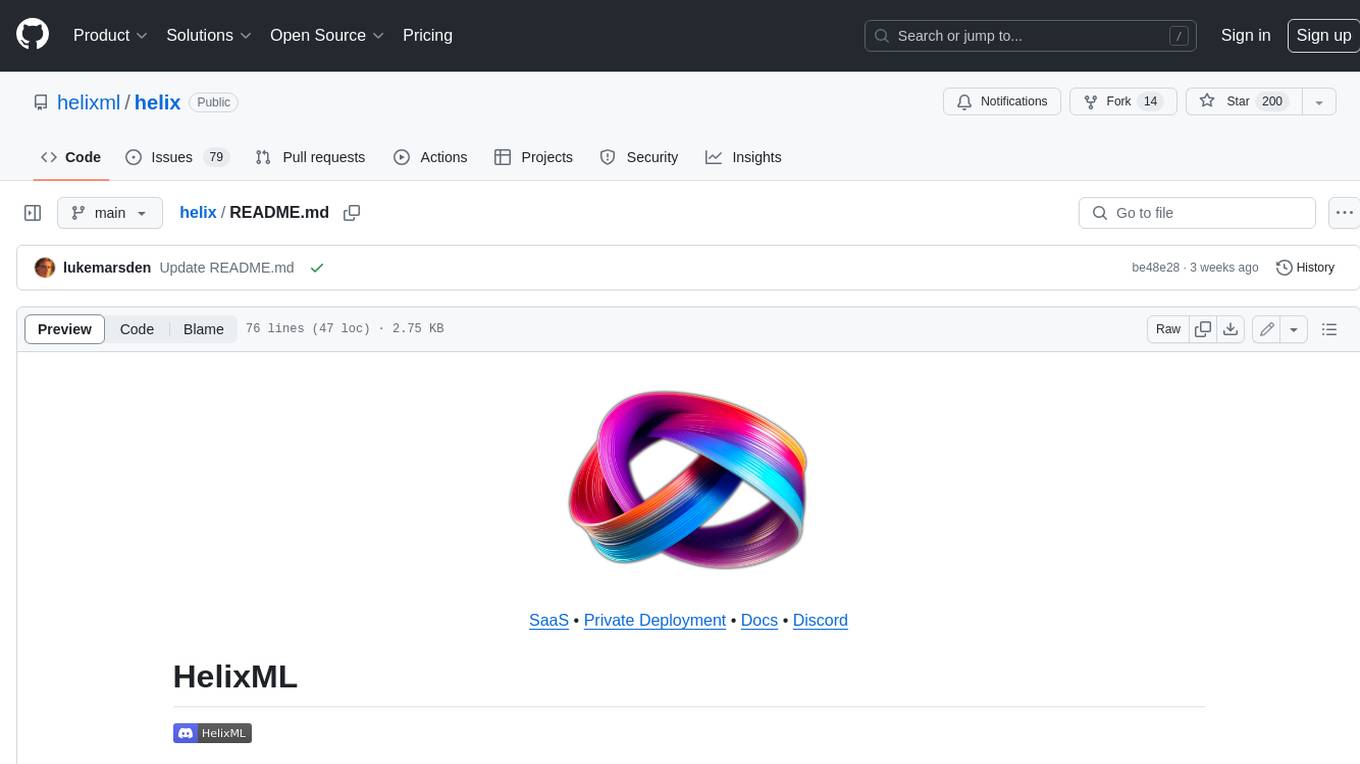
helix
HelixML is a private GenAI platform that allows users to deploy the best of open AI in their own data center or VPC while retaining complete data security and control. It includes support for fine-tuning models with drag-and-drop functionality. HelixML brings the best of open source AI to businesses in an ergonomic and scalable way, optimizing the tradeoff between GPU memory and latency.
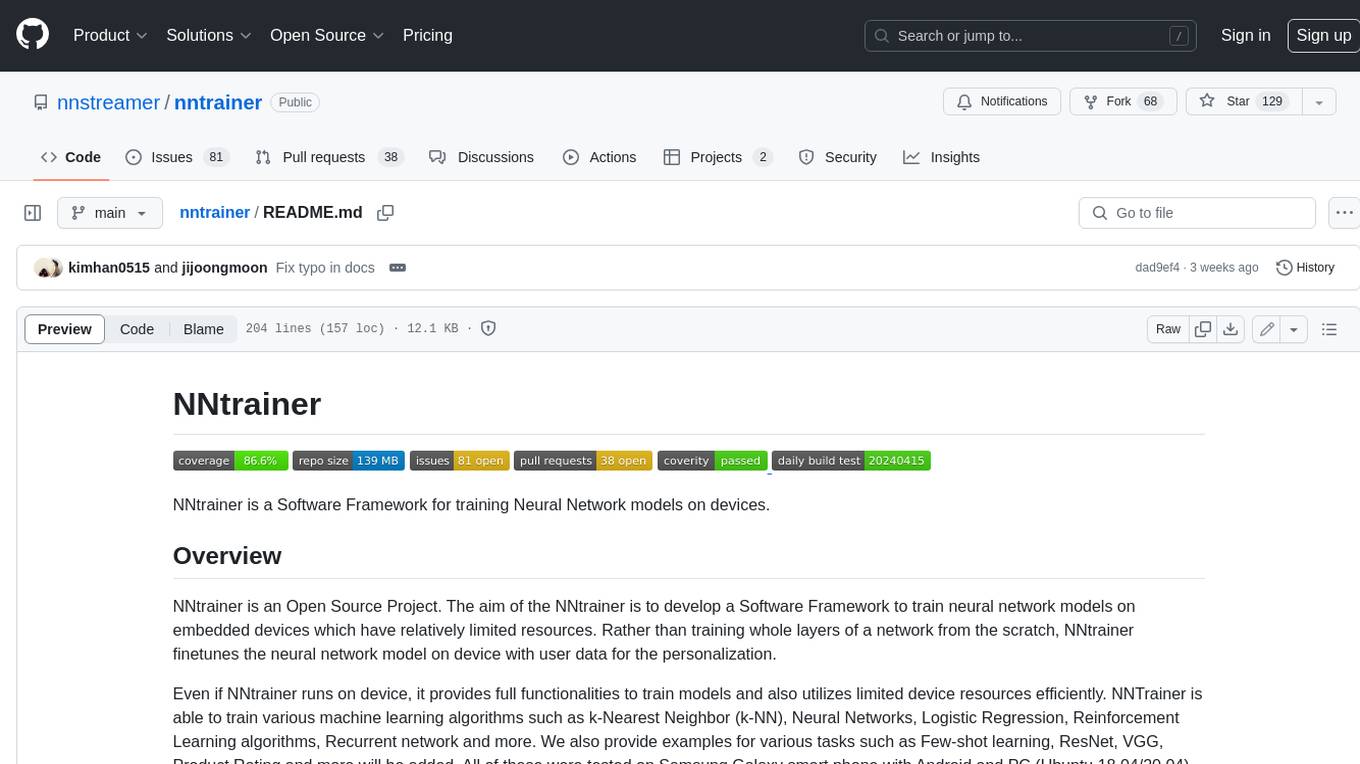
nntrainer
NNtrainer is a software framework for training neural network models on devices with limited resources. It enables on-device fine-tuning of neural networks using user data for personalization. NNtrainer supports various machine learning algorithms and provides examples for tasks such as few-shot learning, ResNet, VGG, and product rating. It is optimized for embedded devices and utilizes CBLAS and CUBLAS for accelerated calculations. NNtrainer is open source and released under the Apache License version 2.0.
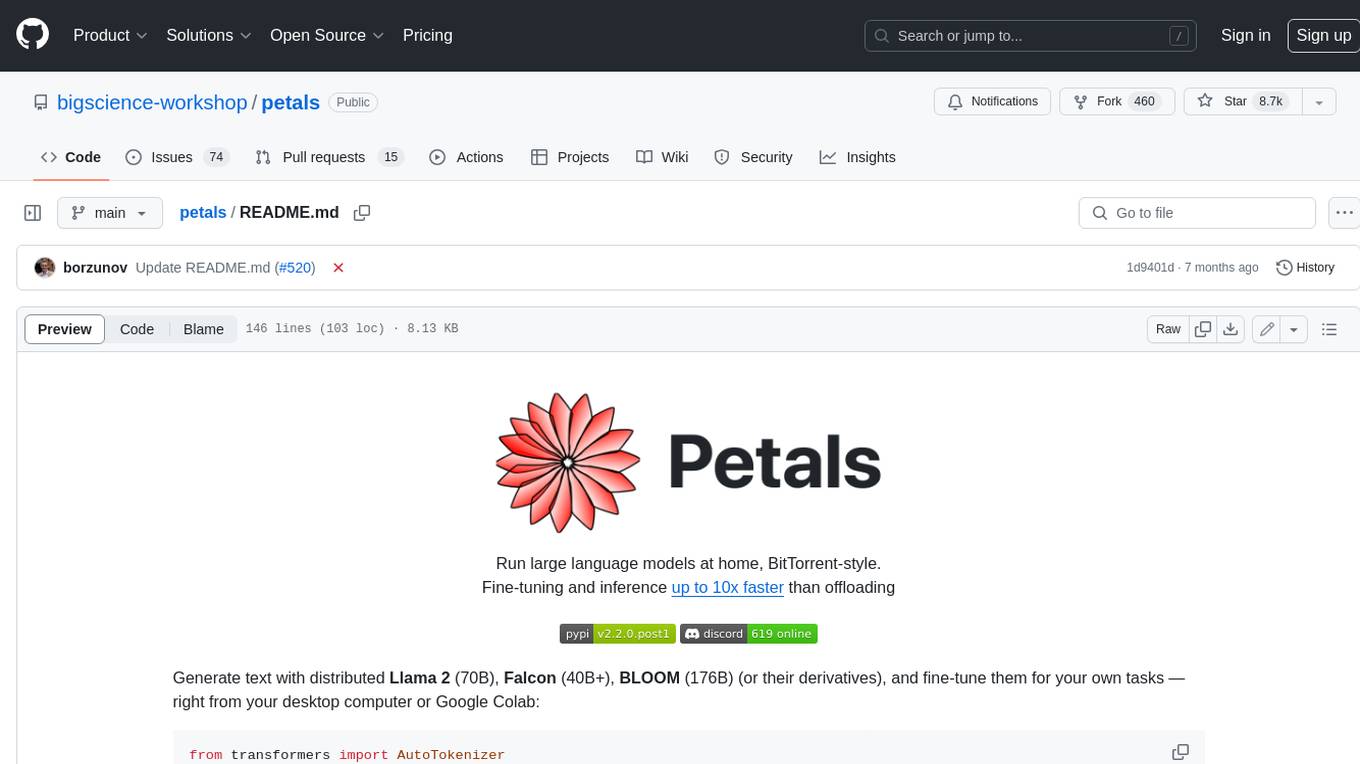
petals
Petals is a tool that allows users to run large language models at home in a BitTorrent-style manner. It enables fine-tuning and inference up to 10x faster than offloading. Users can generate text with distributed models like Llama 2, Falcon, and BLOOM, and fine-tune them for specific tasks directly from their desktop computer or Google Colab. Petals is a community-run system that relies on people sharing their GPUs to increase its capacity and offer a distributed network for hosting model layers.
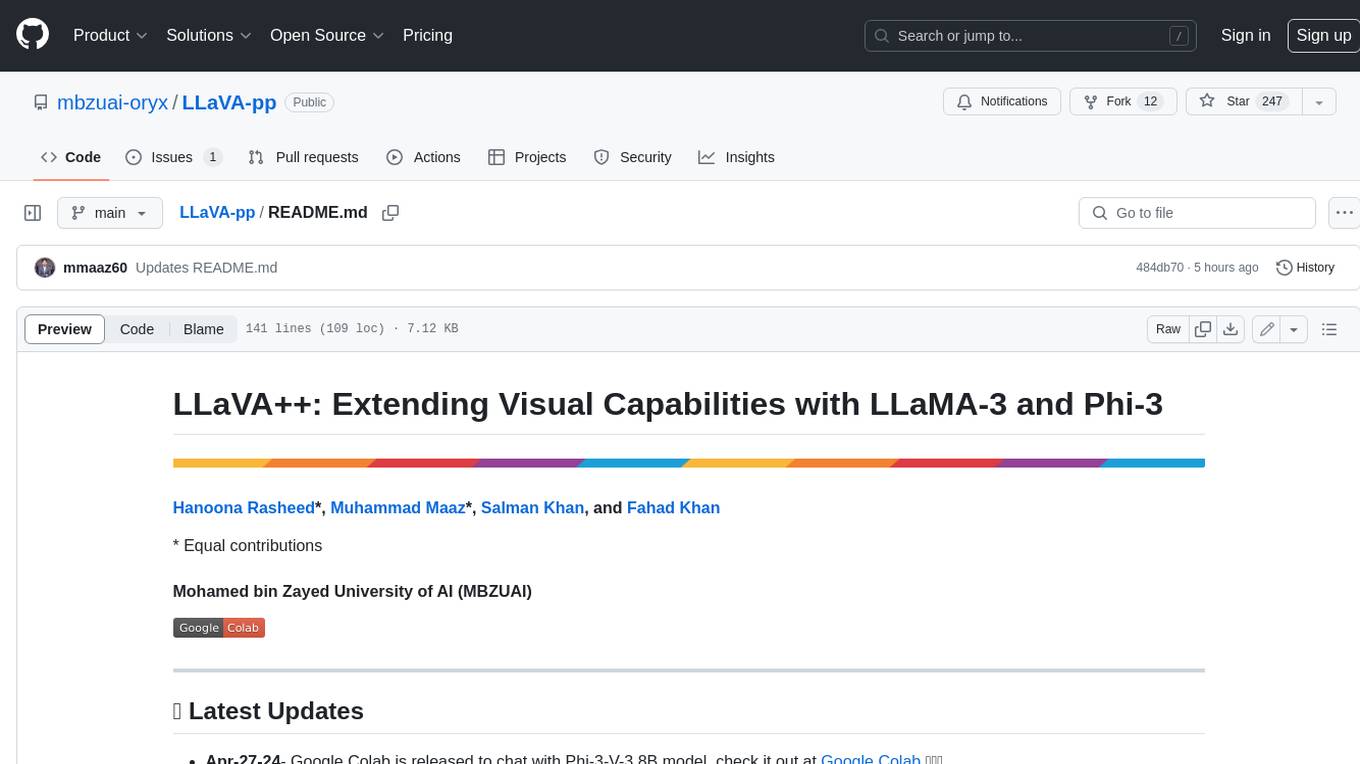
LLaVA-pp
This repository, LLaVA++, extends the visual capabilities of the LLaVA 1.5 model by incorporating the latest LLMs, Phi-3 Mini Instruct 3.8B, and LLaMA-3 Instruct 8B. It provides various models for instruction-following LMMS and academic-task-oriented datasets, along with training scripts for Phi-3-V and LLaMA-3-V. The repository also includes installation instructions and acknowledgments to related open-source contributions.

KULLM
KULLM (구름) is a Korean Large Language Model developed by Korea University NLP & AI Lab and HIAI Research Institute. It is based on the upstage/SOLAR-10.7B-v1.0 model and has been fine-tuned for instruction. The model has been trained on 8×A100 GPUs and is capable of generating responses in Korean language. KULLM exhibits hallucination and repetition phenomena due to its decoding strategy. Users should be cautious as the model may produce inaccurate or harmful results. Performance may vary in benchmarks without a fixed system prompt.
For similar jobs

sweep
Sweep is an AI junior developer that turns bugs and feature requests into code changes. It automatically handles developer experience improvements like adding type hints and improving test coverage.

teams-ai
The Teams AI Library is a software development kit (SDK) that helps developers create bots that can interact with Teams and Microsoft 365 applications. It is built on top of the Bot Framework SDK and simplifies the process of developing bots that interact with Teams' artificial intelligence capabilities. The SDK is available for JavaScript/TypeScript, .NET, and Python.

ai-guide
This guide is dedicated to Large Language Models (LLMs) that you can run on your home computer. It assumes your PC is a lower-end, non-gaming setup.

classifai
Supercharge WordPress Content Workflows and Engagement with Artificial Intelligence. Tap into leading cloud-based services like OpenAI, Microsoft Azure AI, Google Gemini and IBM Watson to augment your WordPress-powered websites. Publish content faster while improving SEO performance and increasing audience engagement. ClassifAI integrates Artificial Intelligence and Machine Learning technologies to lighten your workload and eliminate tedious tasks, giving you more time to create original content that matters.

chatbot-ui
Chatbot UI is an open-source AI chat app that allows users to create and deploy their own AI chatbots. It is easy to use and can be customized to fit any need. Chatbot UI is perfect for businesses, developers, and anyone who wants to create a chatbot.

BricksLLM
BricksLLM is a cloud native AI gateway written in Go. Currently, it provides native support for OpenAI, Anthropic, Azure OpenAI and vLLM. BricksLLM aims to provide enterprise level infrastructure that can power any LLM production use cases. Here are some use cases for BricksLLM: * Set LLM usage limits for users on different pricing tiers * Track LLM usage on a per user and per organization basis * Block or redact requests containing PIIs * Improve LLM reliability with failovers, retries and caching * Distribute API keys with rate limits and cost limits for internal development/production use cases * Distribute API keys with rate limits and cost limits for students

uAgents
uAgents is a Python library developed by Fetch.ai that allows for the creation of autonomous AI agents. These agents can perform various tasks on a schedule or take action on various events. uAgents are easy to create and manage, and they are connected to a fast-growing network of other uAgents. They are also secure, with cryptographically secured messages and wallets.

griptape
Griptape is a modular Python framework for building AI-powered applications that securely connect to your enterprise data and APIs. It offers developers the ability to maintain control and flexibility at every step. Griptape's core components include Structures (Agents, Pipelines, and Workflows), Tasks, Tools, Memory (Conversation Memory, Task Memory, and Meta Memory), Drivers (Prompt and Embedding Drivers, Vector Store Drivers, Image Generation Drivers, Image Query Drivers, SQL Drivers, Web Scraper Drivers, and Conversation Memory Drivers), Engines (Query Engines, Extraction Engines, Summary Engines, Image Generation Engines, and Image Query Engines), and additional components (Rulesets, Loaders, Artifacts, Chunkers, and Tokenizers). Griptape enables developers to create AI-powered applications with ease and efficiency.
